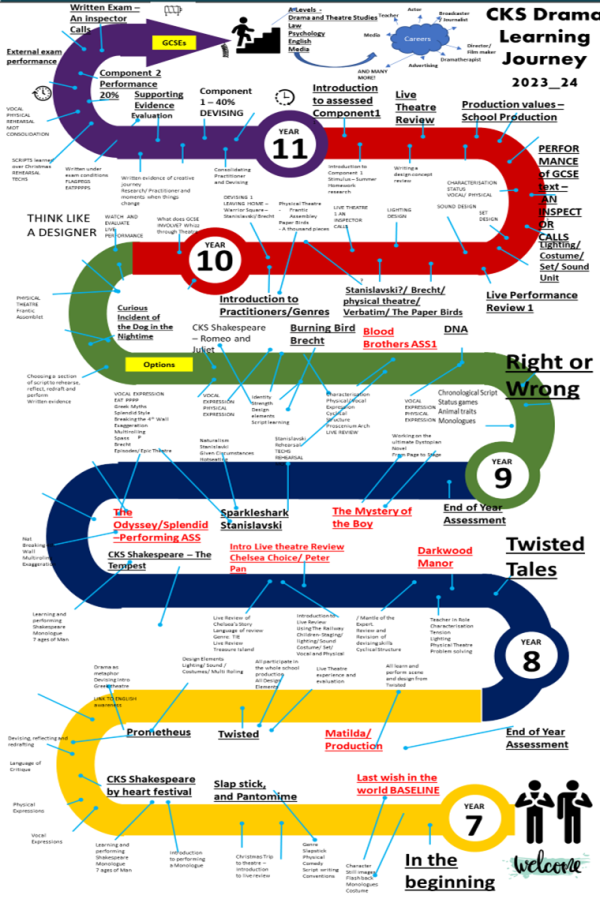Drama
Curriculum Intent
Our Key Stage 3 Drama curriculum aims to intentionally develop character and ignite creativity through engaging theatrical experiences. Throughout these years, we foster communication skills, boost self-expression and cultivate a love for the arts, laying a foundation for a lifetime appreciation of Drama.
How knowledge and skills build through Key Stage 3
At Cirencester Kingshill School we have designed a rich curriculum where our students use drama as a subject that not only provides them with the subject-specific knowledge, but also transferable human skills. The Drama Journey shows how these skills and knowledge are revisited and refined throughout the three years at KS3.
These skills include:
- Communication and cooperation – Learning how to communicate in an appropriate way which in turn leads to being able to cooperate with others, creating a harmonious learning space, accessible for all.
- Creativity and creation – Creating a character, a storyline and setting the scene.
- Confidence – Rehearsing, refining and performing.
- Critical Thinking and evaluation– Analysing what makes a theatrical performance successful.
- Performance - Being able to portray a variety of roles, themes and styles through physical and vocal expression
- Expression – Exploring different ways to show mood, intent, purpose.
Each year at KS3 students will build their subject knowledge through:
- Dramatic text from the UK and the world.
- Practitioners and genres
- Devising
- Performance skills vocal and physical skills
- Design and analysis for stage (lighting, costume, sound, set)
KS4 Curriculum Intent and Rationale
Drama gives students a range of skills that cannot be undervalued. So-called soft skills that make us eminently more employable. Taken in collaboration with a range of other subjects, Drama actively inspires students to grow into outgoing and confident adults. The course develops the ability to work within a group and, above all, it hones those techniques that allow a chosen few to present themselves confidently to an audience.
Studying GCSE Drama at Cirencester Kingshill will provide students with critical core skills unlike any other GCSE, preparing them for what life has in store. Drama is a dynamic practice that encourages students to be curious, open, present, inquisitive and funny. Drama provokes the imagination, allowing students to explore and reflect on important subject matter, such as contemporary, historical, socio-political and cultural issues; helping students to create new values, build self-esteem and gain confidence in their own opinion in a safe and stimulating environment.
We follow the EDUQAS specification for Drama, where you can choose to specialise in performance or design. Design candidates can focus on costume, set, lighting or sound and will work with their peers to bring their designs to life on stage.
Drama can reinforce the rest of the GCSE curriculum and beyond into Key Stage 5, helping students develop transferable skills such as increasing your ability to think divergently. Drama teaches students how to become critical consumers of theatre rather than just passive viewers. To help with this, Year 11 students are taken on a trip to a theatre which is then written about in their final exam.
7 Reasons why we offer Drama GCSE at Cirencester Kingshill School:
- No subject teaches you how to work well in a team quite like drama. Drama will allow you to develop your patience, ability to compromise and communication skills.
- You will learn discipline.
- In Drama you will be asked to improvise on several occasions. This allows you to think on your feet, develop your initiative and will encourage you to be more proactive.
- Drama stimulates you to be constantly creative. Drama will force you to regularly produce exciting, functional, and convincing ideas, to a deadline and this ability will stay with you.
- Empathy is an important life skill, this is an invaluable skill that will open your mind, improve the way you interact with people and is especially useful if you are considering a career in caring, teaching, or social work.
- Analysing Drama productions allows you to develop your critical thinking skills. This is useful for several jobs and is great if you are planning to take English Literature, Media Studies, or Film Studies at degree level.
- You will gain in confidence and overcome the fear of making mistakes in a fun, creative and supportive environment.
Useful resources
- https://www.thenational.academy/teachers/programmes/drama-secondary-ks3-l/units
- https://www.bbc.co.uk/teach/topics/cedpxekg81yt
- https://www.bbc.co.uk/teach/class-clips-video/articles/zk8dy9q

